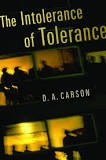The Intolerance of Tolerance
Doug Hart | November 2015 - Highfields Book of the Month
By D.A. Carson - (2012) : Inter Varsity Press
 At its core this book seeks to educate the reader about the changing definition of the word ‘tolerance’ and its effect on society as a whole and Christianity and Christians in particular. Throughout the book Carson sets out to define the old and new meanings of the word tolerance and describes them thus:
At its core this book seeks to educate the reader about the changing definition of the word ‘tolerance’ and its effect on society as a whole and Christianity and Christians in particular. Throughout the book Carson sets out to define the old and new meanings of the word tolerance and describes them thus:
'The old tolerance is the willingness to put up with, allow, or endure people and ideas with whom we disagree; in its purest form, the new tolerance is the social commitment to treat all ideas and people as equally right, save for those people who disagree with this view of tolerance.
Advocates of the new tolerance sacrifice wisdom and principle in support of just one supreme good: upholding their view of tolerance. So those who uphold and practice the older tolerance, enmeshed as they inevitably are in some value system, are written off as intolerant. Thus banished, they no longer deserve a place at the table. [p.98]'
Throughout this book Carson juxtaposes these two positions siting example after example where in the name of the new tolerance differences of opinion cannot be tolerated. One example from the domain of education is the case of Scott McConnell whose term paper for a class at Le Moyne College advocated corporal punishment received an A minus. However, according to Carson, the student was dismissed from the college by the chair of the education department due to an alleged 'mismatch between [his] personal beliefs…and the Le Moyne College program goals.' [p. 29].
There is an ongoing battle that we are all involved with which many of us see around us every day - political correctness, multi-culturalism, and moral-relativity. All these seem to marginalise Christianity whilst proclaiming themselves the new moral good. Christians at best are relegated to the status of ignorant fools who should be ignored and side-lined, at worst they should be confronted at every turn for their bigotry and intolerance. Carson notes that lately this is most strongly expressed in Christianity and Christians relationship with homosexuality, for example there are many instances of states in the U.S. attempting to disband Christian unions at colleges and universities who were accused of discrimination, '…either because it [i.e. the union] insisted that its officers (though not its members) subscribe to its statement of faith, or because it refused to accept among its officers those who advocated or practiced homosexuality' [p.30].
You will find many chapters within the book constructing a narrative that shows a movement away from the old meaning of tolerance to the new meaning, whilst this can be seen as a rather depressing development. Carson finishes the book with a chapter covering 10 points on how Christians can reverse the trend towards the new tolerance and engage with it in the modern world:
- First expose, the new tolerance's moral and epistemological bankruptcy
- Persevere for a place for truth
- Expose the new tolerance's condescending arrogance
- Insist that the new tolerance is not progress
- Distinguish between empirical diversity and the inherent goodness of all diversity
- Challenge secularism's ostensible neutrality and superiority
- Practice and encourage civility
- Evangelize
- Be prepared to suffer, and finally, delight in and trust in God
A thoroughly good read, which whilst at times can feel somewhat academic, and you may have to refer to other sources of information to understand some of the terminology, is generally accessible and informative, definitely a recommended book for those interested in modern society and how it impacts and interacts with Christians.
Document Actions

